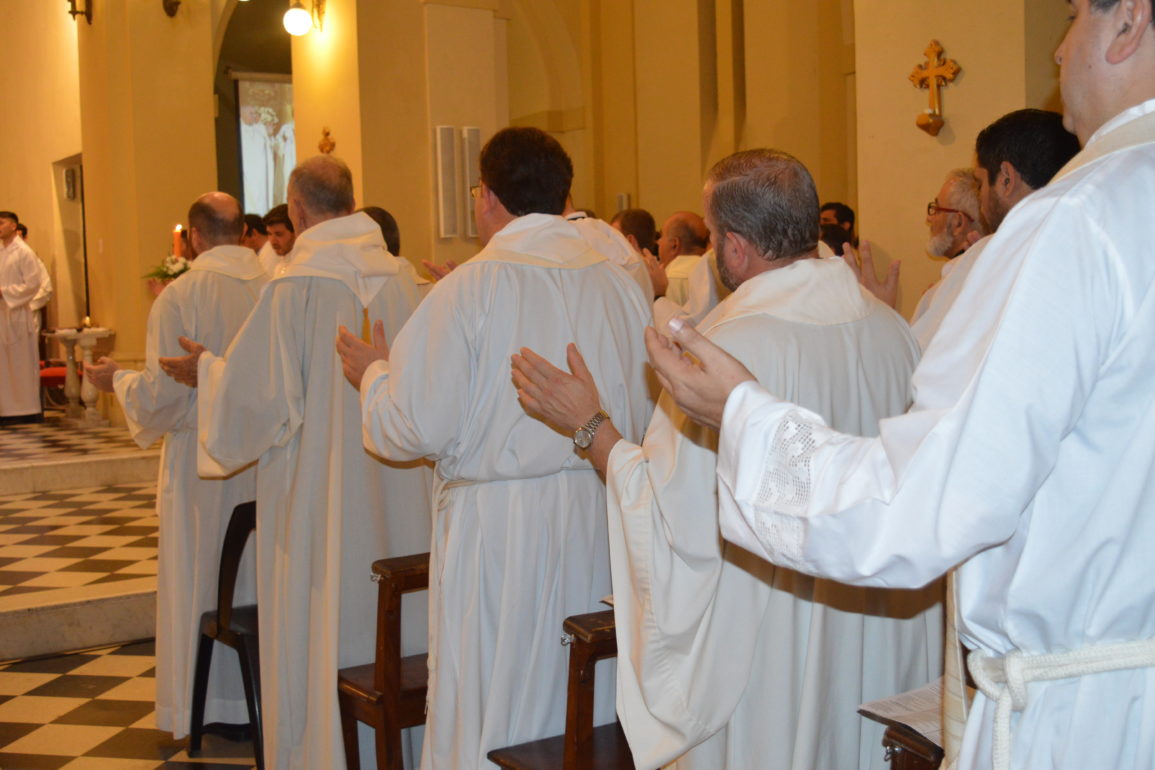The Chrism Mass is one of the celebrations that best expresses the Bishop’s communion with his priests. It is usually celebrated on Holy Thursday, but the day can be changed in keeping with the pastoral needs of a place. But what is celebrated in this “Chrism Mass”?
In the first place, we can affirm that this celebration is a “feast of the priesthood.” In fact, with the Chrism Mass, the Church looks to the one and true priest, who is Jesus Christ, the Lord. By the mystery of the Incarnation, Christ was made man: God Himself was made man to be able to offer Himself for men. He assumed human nature to make us eternal. Therefore, He is the one Mediator between God the Father and men. Abolished with His offering are the ancient sacrifices. He has offered the one and true sacrifice, which remains in time and does not pass. As a pledge of this mystery, He has left us the Eucharist, through which we renew and actualize this unique sacrifice.
All of us who are baptized participate in the royal priesthood; therefore we can pray for others, offer sacrifices and thus collaborate with Christ in the redemption of the world. However, the Lord wanted His holy sacrifice (the Eucharist) to be perpetuated in history, that His mercy be made “flesh” in the midst of the world. Therefore, to perpetuate His sacred mission “He chose men of this people so that, by the imposition of hands, they could take part in His sacred mission” (Preface II of Ordinations), men that, moreover, Christ treats “with brotherly love.” And all this in view of making Himself present carnally, so to speak, in the midst of the world.
This is why in the Chrism Mass all priests, presided over by their Bishop, renew their priestly promises, those they made on the day of their Ordination, with which they sealed an alliance of love with the Lord Himself and with His Bride, the Church. It is a special opportunity for all the faithful to be grateful for the inestimable gift of the priesthood in the world and, at the same time, to love their priests, to want to help them in carrying out their mission, and to pray for them. How much priests need their faithful!
Another essential aspect of this celebration is that in fact in it, the Bishop blesses the oils of the sick and catechumens and consecrates the chrism. What value does this have for us?
Oil has had a very special value in the whole of Scripture. Kings, prophets, and priests were anointed with oil. Oil is a sign of fortitude, of consolation, of blessing, of divine election . . . All this becomes patent in the Church’s Sacraments, especially in the Sacraments where oils are used and, of course, chrism.
Oil of the Sick and Catechumens
Oil of the sick: is the oil used in the Sacrament of the Anointing of the Sick. In this case, oil is the sign and signal of relief in sickness. With this Sacrament, Christ becomes our companion in sickness and carries out His office of Consoler (Special Exercises, no. 224).
Oil of the catechumens: this blessed oil is used in the rite of the Sacrament of Baptism. In this case, the oil is a sign and signal of fortitude in face of Satan’s snares. So much so that the oil is usually used in the ritual of exorcisms.
Consecration of the Chrism
Holy chrism is not just any oil but perfumed oil. And this shows, at the same time, that it is not blessed but consecrated, as its fundamental mission is consecration. It is used in Baptism, in Confirmation, and in Holy Orders. It is also used in the consecration of churches and altars. It is a sign and signal of consecration, anointing, and election. The Sacraments of Baptism, Confirmation, and Holy Orders are the ones of which we say that they “imprint character,” namely, that they put an indelible seal on the soul. Therefore, they are not repeated in a Christian, as he/she has already been sealed forever, as well as with the “sweet scent of Christ.” All this is done through the holy chrism.
The Chrism Mass encloses in itself all this mystery of love. It is the fruit of Jesus Christ’s surrender out of love. The priesthood, blessing of the oils, and the consecration of the chrism are a prolongation of His salvific and redeeming action in us. Therefore, it is in the context of the “Passion” where Jesus Christ’s logic of love is best understood.
I invite you to live this celebration with renewed enthusiasm. And if we are unable to attend it, let us remember — every time we participate in a Sacrament in which oils are received or chrism –, on what day they were blessed and what they mean. And, at the same time, let us awaken in ourselves our love of Christ who makes Himself present in our priests. Let us pray for them that they may be faithful stewards of the mysteries of God (1Corinthians 4:1-5).
Translation by Virginia M. Forrester










